 Faculty giving fosters excellence across the School of Medicine.There is a longstanding tradition in academic medicine of faculty members giving back to their institutions, and some of the School of Medicine’s most steadfast philanthropic supporters are current and former faculty. “The School of Medicine is doubly fortunate to benefit not only from our faculty members’ expertise and commitment to service, but also from their spirit of philanthropy,” says Selwyn Vickers, M.D., FACS, senior vice president for medicine and dean of the School of Medicine. “Faculty gifts are especially meaningful because they are a lasting testament to the faith these men and women have in our school and the good it can do in our community and across the globe.” Highlighted here are a few of the many men and women from across the school who have made a commitment to securing the future of the School of Medicine.
Faculty giving fosters excellence across the School of Medicine.There is a longstanding tradition in academic medicine of faculty members giving back to their institutions, and some of the School of Medicine’s most steadfast philanthropic supporters are current and former faculty. “The School of Medicine is doubly fortunate to benefit not only from our faculty members’ expertise and commitment to service, but also from their spirit of philanthropy,” says Selwyn Vickers, M.D., FACS, senior vice president for medicine and dean of the School of Medicine. “Faculty gifts are especially meaningful because they are a lasting testament to the faith these men and women have in our school and the good it can do in our community and across the globe.” Highlighted here are a few of the many men and women from across the school who have made a commitment to securing the future of the School of Medicine.
Advancing Research
Originally from Chicago, Suzanne Michalek, Ph.D., is a professor emeritus in the UAB Department of Microbiology. Following her initial training in genetics, she spent several years doing research in immunology at the University of Chicago. She earned her Ph.D. at UAB, where her research in mucosal immunology showed that oral immunization with a vaccine induced salivary IgA antibody responses that protect against tooth decay. These studies provided evidence for the existence of a common mucosal immune system and for the potential development of a human oral vaccine against tooth decay, as well as other infectious diseases that affect mucosal surfaces. Following postdoctoral studies at the National Institutes of Health, she joined the Mucosal Immunology Group at UAB in 1979.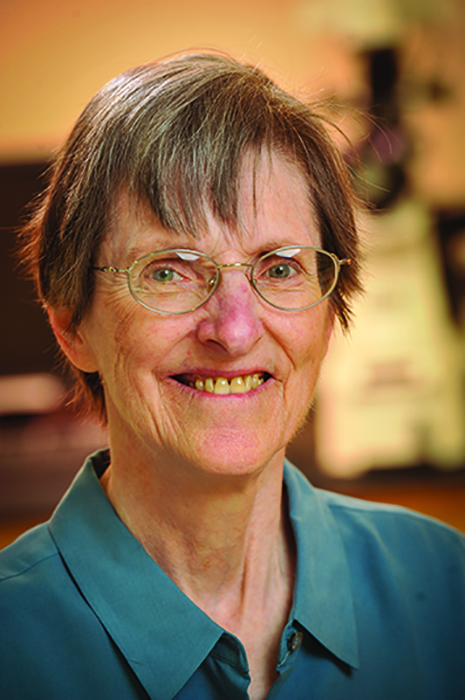 Suzanne Michalek
Suzanne Michalek
Michalek’s history of giving to UAB dates back to her earliest days at the School of Medicine. While she has made gifts to programs across the university over the years, her greatest philanthropic effort has been establishing the Michalek Microbiology General Research Fund. Recently, Michalek has taken advantage of an IRA charitable rollover option to grow the fund.
Michalek says the purpose of the research fund is to bridge gaps in funding for her own research and for colleagues who might need a helping hand. “This was created as a source of discretionary funds, as a way to level out the highs and lows both for my own work and others’ work,” she explains. “We can use it to direct funds to researchers who might need a little boost and to support visiting researchers as well.”
Michalek says her desire to leave a legacy at UAB has grown as her career has progressed. “I have devoted many years of my life and my career to this institution, and I’m very proud of that,” she says. “I would like to give something back to it, for posterity if possible. There are several different types of endowments I am considering—lectureships, professorships—but for now we need to be flexible with the money.”
As for her own research, she continues to be involved in studying immunological mechanisms in host/microbial interactions and in developing an anti-caries (tooth decay) mucosal vaccine, as well as mucosal vaccines against a variety of infectious diseases, including tularemia. “Very recently I have also been involved in providing an animal model to determine the effectiveness of anti-microbial compounds in protecting against tooth decay,” she says. “My collaborators are developing small molecules that can be taken orally or painted on the teeth of the experimental rats to inhibit the bacterium that causes tooth decay without affecting the oral microbiome. The results so far are really exciting.”
Heart of Giving
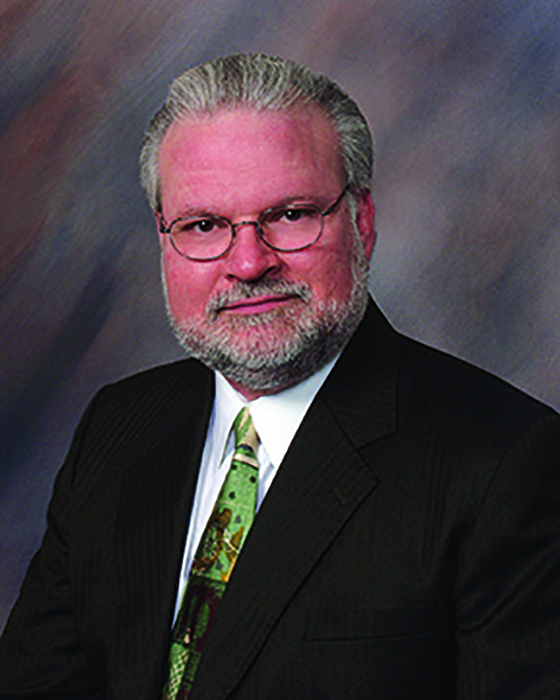 Robert BourgeRobert Bourge, M.D., senior vice chair in the Department of Medicine and holder of the E. A. and Abbie Drummond Endowed Chair in Cardiovascular Medicine, among other roles, has a deep knowledge of the history of cardiovascular medicine at UAB. Having experienced UAB as an internal medicine resident, cardiology fellow, academic physician, clinical and translational researcher, and educator, he has the perspective to evaluate the School of Medicine’s mission from every angle. He has leveraged that perspective by committing several strategic gifts to the school, building on a giving history that dates to 1982.
Robert BourgeRobert Bourge, M.D., senior vice chair in the Department of Medicine and holder of the E. A. and Abbie Drummond Endowed Chair in Cardiovascular Medicine, among other roles, has a deep knowledge of the history of cardiovascular medicine at UAB. Having experienced UAB as an internal medicine resident, cardiology fellow, academic physician, clinical and translational researcher, and educator, he has the perspective to evaluate the School of Medicine’s mission from every angle. He has leveraged that perspective by committing several strategic gifts to the school, building on a giving history that dates to 1982.
His most recent philanthropic efforts interweave Bourge’s professional and personal interests. They include several projects in the Division of Cardiovascular Disease, where he formerly served as division director: an endowed scholar position in heart transplantation, created in partnership with David McGiffin, M.D.; an endowed scholar position in mechanical circulatory support—a life-saving treatment option for critically ill patients with advanced heart failure—established in concert with James Kirklin, M.D.; a pledge to elevate the recently established Robert C. Bourge and Cutessa D. Bourge Endowed Professorship in Cardiovascular Disease to a fully funded endowed chair; and a planned gift to establish the Robert C. Bourge and Cutessa D. Bourge Endowment for Cardiovascular Disease General Support. The endowed scholar funds have become important faculty recruitment and retainment assets—Jose Tallaj, M.D., was named the inaugural Bourge-McGiffin Endowed Scholar in Heart Transplantation, and Salpy Pamboukian, M.D., MSPH, became the inaugural Bourge-Kirklin Endowed Scholar in Mechanical Circulatory Support.
Bourge has also established, in conjunction with the Division of Nephrology, the Detraz Family Endowed Professorship in Polycystic Kidney Disease in the Department of Medicine, an effort that hits close to home. Polycystic kidney disease is a hereditary condition with complications ranging from hypertension to renal failure, and it often leads to the need for a kidney transplant. The disease runs in the family of Bourge’s wife, Cutessa Detraz Bourge, so he designated that the fund bear the Detraz name. “I asked Dr. Anupam Agarwal, director of the Division of Nephrology, for recommendations for a researcher that the fund can support, and he suggested Dr. Michael Mrug as an established star in that area and offered matching funds to our gifts as well,” Bourge says.
Bourge also recently provided funding to the Department of Medicine as a founding member of the national Society of Bedside Medicine, an organization dedicated to bedside teaching and improving physical examination and diagnostic skills.
Bourge says he believes that philanthropy is vital to advancing the school’s missions in patient care, research, and medical education, and has earmarked gifts to address immediate needs and provide for future success. “With all our mission areas—in clinical care, research, and teaching—funding can wax and wane,” he says. “I believe these endowments can provide stability and help us keep the best people here at UAB and continue our history of excellence.”
Surgery Leaders Give Back
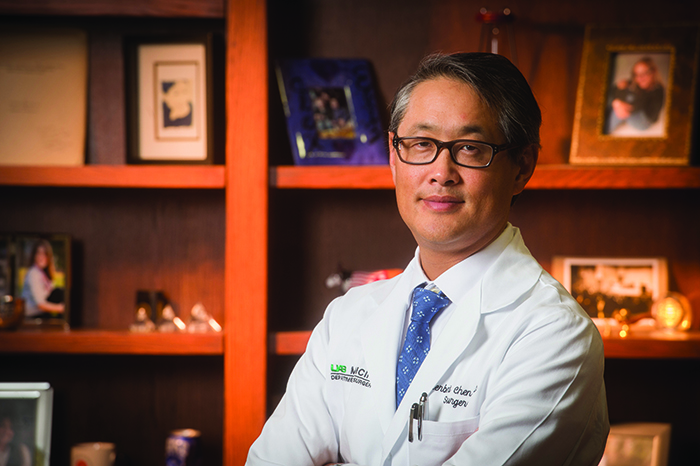 Herbert ChenHerbert Chen, M.D., an internationally recognized endocrine surgeon, researcher, and medical educator, joined UAB from the University of Wisconsin School of Medicine in 2015 as the chairman and Fay Fletcher Kerner Endowed Chair of Surgery in the Department of Surgery and surgeon-in-chief of UAB Hospital. Less than two years into his tenure at UAB, Chen and his wife Harriet made a significant pledge to establish the Herb and Harriet Chen Endowed Professorship for Surgical Leadership. He says he was motivated to make the pledge so soon after joining UAB by a desire to “walk the walk” in modeling the commitment he hopes to inspire in others.
Herbert ChenHerbert Chen, M.D., an internationally recognized endocrine surgeon, researcher, and medical educator, joined UAB from the University of Wisconsin School of Medicine in 2015 as the chairman and Fay Fletcher Kerner Endowed Chair of Surgery in the Department of Surgery and surgeon-in-chief of UAB Hospital. Less than two years into his tenure at UAB, Chen and his wife Harriet made a significant pledge to establish the Herb and Harriet Chen Endowed Professorship for Surgical Leadership. He says he was motivated to make the pledge so soon after joining UAB by a desire to “walk the walk” in modeling the commitment he hopes to inspire in others.
“One reason I made the pledge is to emphasize that I’m committed for the long term to UAB,” he says. “In my role as chair, I have the honor of working with talented faculty, residents, and students who want to make a big impact for the people of Birmingham and Alabama. I am committed to supporting them in any way possible. Our department depends on philanthropy to drive our clinical, research, and education missions, so it’s hard for me to ask individuals to give to this cause if I don’t do that myself.”
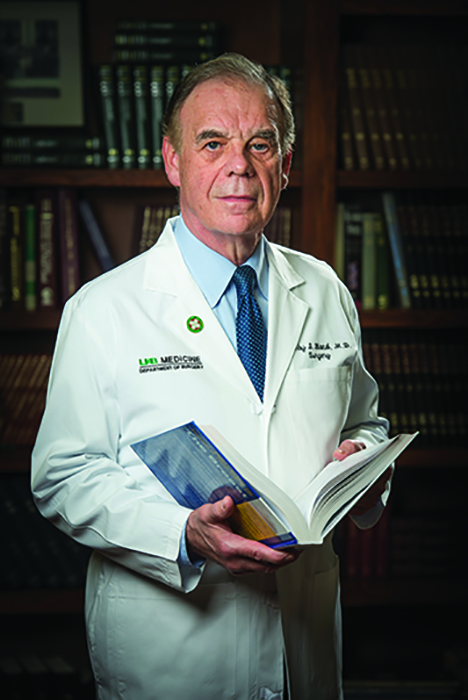 Kirby BlandIn an increasingly competitive faculty recruitment environment, Chen says having endowed positions to offer candidates can be a deciding factor. This was a major motivation for him to make the pledge for the endowed professorship. “Our department is increasingly being recognized as one of the best in the country,” he says. “Creating endowed professorships provides vital support for faculty development, retention, and recruitment. We have been able to recruit and retain the most talented faculty in the country in large part due to these endowed professorships and chairs.”
Kirby BlandIn an increasingly competitive faculty recruitment environment, Chen says having endowed positions to offer candidates can be a deciding factor. This was a major motivation for him to make the pledge for the endowed professorship. “Our department is increasingly being recognized as one of the best in the country,” he says. “Creating endowed professorships provides vital support for faculty development, retention, and recruitment. We have been able to recruit and retain the most talented faculty in the country in large part due to these endowed professorships and chairs.”
Chen succeeded longtime chair Kirby Bland, M.D., who now serves as a professor of surgical oncology and chair emeritus in the Department of Surgery and is a distinguished faculty scholar in the School of Medicine and a senior advisor for the UAB Comprehensive Cancer Center.
Bland made a pledge to an endowed chair that, once fully funded, will bear his name in recognition of his 16 years as chair of surgery. “I made the gift to help kick off the fundraising campaign that’s not quite finished yet,” he says. “It was very gratifying to see that we raised more than $1 million for the endowed chair from many individual donors fairly quickly, mostly from former residents who trained with me as well as friends and former patients.
“To have a chair named after you is a significant honor, but more importantly it provides salary support for the person who will eventually hold that chair,” he says. “It demonstrates nationally to other surgery departments that UAB is committed to the development of careers through this kind of continuing support. That’s the way you recruit the best people and retain them. And it’s not a one-shot deal. It will be sustained through generations.”
Supporting Students
As a child growing up in post-war Korea, Moon Nahm, M.D., was fascinated by science but could not access any science books in his then-poverty-stricken country. His family later moved to the U.S. and he attended Washington University in St. Louis, Missouri, for his undergraduate through postdoctoral training. Since joining UAB 17 years ago, Nahm has built what a National Institutes of Health (NIH) review called “a national treasure”: the World Health Organization (WHO) Pneumococcal Serology Reference Laboratory at the School of Medicine.
Nahm’s research focuses on immune responses to pneumococci, the diagnosis of pneumococcal infections, and the development of vaccines against pneumococcal infections. In addition to the WHO Reference Laboratory, his laboratory serves as the Bacterial Respiratory Pathogens Reference Laboratory for the NIH.
Nahm uses the labs to help achieve a new goal: affordable pneumonia vaccines for the world. His research focuses on helping scientists around the world produce pneumococcal vaccines at prices that will propel their widespread use against S. pneumoniae infections. S. pneumoniae is the leading cause of pneumonia.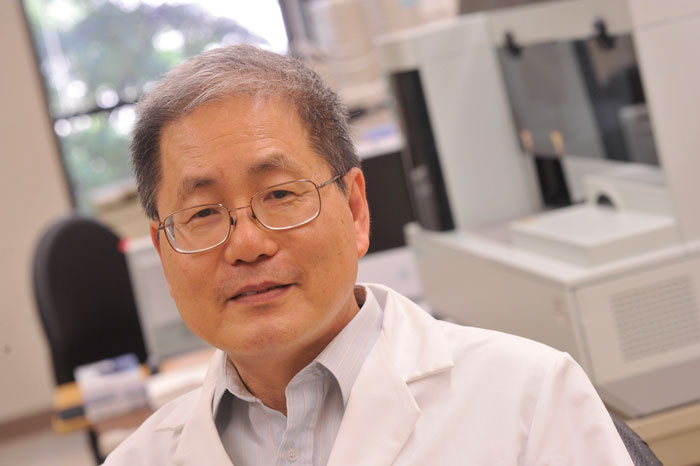 Moon Nahm
Moon Nahm
“We need to reduce the cost for use in developing countries—from more than $100 a dose in the United States to less than $10 per dose,” Nahm says. “We developed the tools with which companies can develop low-cost vaccines and UAB has licensed the tools to various companies at extremely low-cost. That effort is beginning to bear fruit—several companies are beginning to produce vaccines and are testing them right now.”
Nahm says he considers attending medical school to be a critical turning point in his life. In hopes of helping more young people achieve their dreams of a career in science and medicine, he recently made a gift to establish the Moon H. Nahm, M.D., and Laura S. Nahm, M.D., Endowed Scholarship in Medicine. “One of the reasons I’m interested in helping students is because I came to the U.S. as a senior in high school and our family was still getting settled when I was going through college and medical school,” he says. “I got some scholarships and I would like to pay back the benefits I got when our family was new to the country.”
Nahm specifically wanted the name of his daughter, Laura Nahm, M.D., a 2011 School of Medicine graduate, included in the name of the scholarship, in hopes she will one day take ownership of it as a multigenerational philanthropic effort. “She went to UAB for medical school, and I want her to be part of giving back to the university,” he says. “I hope in her lifetime she will continue to nurture this scholarship so it will increase over time.”
To learn more about giving to the School of Medicine, visit uab.edu/medicine/home/give.
By Jane Longshore